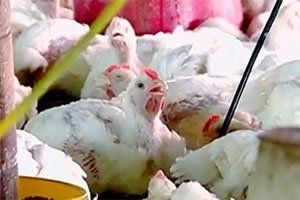in-VIGOR-ate®
Poultry Heat Stress
Poultry Heat Stress
Support for Poultry Heat Stress During the Summer
Summer weather can easily create poultry heat stress. It begins when temperatures rise above 75° F and is accelerated with high humidity. Temperatures within the range of 85 to 100° F cause serious problems that will lead to mortalities.
Management to minimize poultry heat stress
includes:
- Increasing ventilation
- Reducing flock density
- Providing an adequate supply of drinking water
- Providing a supply of “cool” drinking water.
When poultry become stressed by heat they work to dissipate heat from their bodies. Feed intake is reduced while water consumption increases. Blood flow is directed from internal body organs (including the digestive tract) to dilated vessels in peripheral tissues to facilitate heat loss. A major physiological response is to lose more heat through evaporative cooling by panting. Panting results in a loss of electrolytes (particularly potassium) and an increase in blood pH.
Poultry experience greater stress at heavier body weights. Mortalities increase dramatically in hen and tom turkeys after 11 and 14 weeks of age, respectively. Laying hens exhibit either a drop in egg production, smaller eggs or thinner egg shells.
Support for Poultry Heat Stress with in-VIGOR-ate®
Management recommendations by University poultry specialists and genetic companies routinely recommend supplementing drinking water with electrolytes and vitamins during heat stress. Therefore, administering in-VIGOR-ate®
provides the needed nutritional support to avoid poultry heat stress and enables a higher level of performance.
- High potassium level supplementation in drinking water has been reported to stimulate increased water intake (J. Appl. Poult. Res., 2008).
- The high potassium level in in-VIGOR-ate® helps maintain the desired blood acid-base balance and pH.
- Niacin supplementation promotes vasodilation to aid in heat dissipation.
- Vitamins A, D3, E and C nourish the immune system that is additionally challenged during heat stress and reduces oxidative stress (Food and Nutrition Sciences, 2013).
- Acidification with citric acid enhances water palatability.
- Probiotics help maintain a desired gut microflora balance during erratic eating patterns.
